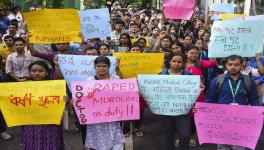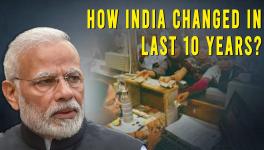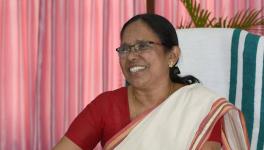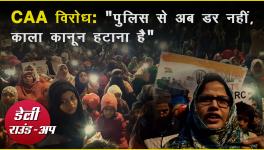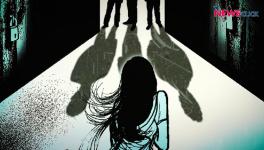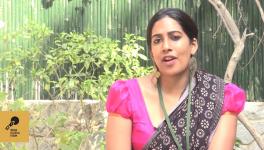The Republic of Ban
With the ban on the documentary film, 'India's Daughter' it becomes evident that the ban culture now is only an extension of larger ideological motive of the current government. Bans now extending from films to writers to even beef, the government feels it has the right to monitor what people should watch, read and eat. Writer, Githa Hariharan discusses this culture of bans with filmmaker Nakul Singh Sawhney from Newsclick and its implications.

Rough Transcript
Nakul Singh Sawhney (NSS): Hello and welcome to Newsclick. We have with us today writer, Ms. Githa Hariharan and we are going to discuss with her the recent ban on the documentary film Indias's daughter and in fact, not just the ban on Indias' Daughter but this whole sort of culture of banning which is picking up in the recent past. Welcome to Newsclick Githa.
Githa Hariharan (GH): Thank you.
NSS: Githa, first of all the film, India's Daughter the fact that parliamentarians across the party lines have come out and spoken in favour of this ban. How do you react something like this. In fact what they are saying it is disturbing social harmony. These are the people who make most regressive statements anti women themselves. And in fact, the lot of what the rapist is saying in the film is not very different from what they have made. So, how do you react to something like this.
GH: I don't think it is a question of parliamentarians. Across society, the most powerful to the most alleged man or women on the street. You are going to have multiple opinions why banning should happen. In recent times of course we have been hearing about the hurt sentiment so we became a republic of hurt and we have effortlessly become the republic of banning. One of the oldest republic of banning is that it shows India as the republic of banning in a bad light. Clearly, it is more important that to do PR in the world at large to keep your citizens safe. So the well being of your citizens come second and if you remember years back, Satyajit Ray's films were criticised for showing for being rather unattractive India. So we the citizens are not in the business of doing PR for incredible India. We want to have our real lives to have our choices to our well being, to our rights as citizens. Not protection as the patronising, patriarchal leaders tell us that the women should be protected. No, we just need our rights. So I would say that whatever your reasons that a society which bans films, books, music, food violates our rights. There are two sets of rights we are talking about. One is that of the cultural practitioner. Two, write, make films. And it is possible; you know as a filmmaker, I know as a writer that if we are not allowed to writer or to paint or talk about all kinds of subjects in films judge the work of art as that. Judge the film, critique it, disagree with it. Make your own film or it offends it you deeply don't see it. See the kind of film you want to. So that is not a valid response to ban something because you disagree with it because it is not what you would like to see and so on. So what happens then you not only destroy the film makers right or the writers right to ask questions or to critique to offend because that's what you have to do as a cultural practitioner. But also the right of those who are making the film for. So we will never have the society where we can debate unless people are allowed to see the films are allowed to read books and judge for themselves and debate. In fact, I must point out that this particular film has created a certain sort of debate which I think is important. So certain sort of issues have come out. You know, we should listen to the rapist for example. I think it is a good thing to debate these. You should be having a film made by non Indian. These are the issues which we have to constantly discuss. But, what really worries me Nakul is that this is not just about the film or about just what is directly seen as cultural practice. What is really worrying is that it feeds into a whole pattern of banning and that is not a pattern that we can ignore.
NSS: In fact, what we are seeing is like you were saying it is not only the cultural practitioners or artists who are on the receiving end of the banning but I mean that of course is happening in a very big way. Fifty shades of Grey got banned recently. Shubradeep's film 'In Dino Muzaffarnagar' is still struck in censors. I mean we have also seen a ban on beef. The state is not only deciding what we can watch, what we can make as an artist they are also deciding what we can eat.
GH: Absolutely, before I come to that if I may interrupt, I just want to point out that this alleged logic of banning is so skewed that Slumdog Millionaire for example was not banned and you could take the same logical process and say look this is appalling poverty the film shows. The fact that I did not think the film was much is a separate point. But I would certainly defend its right to be made and to be screened and then to be debated that why you think it presents poverty in a feel good way. But, the point is at that it was astonishing that various people said oh! It shows how much poverty we have which I found extraordinary that in a city like Bombay, you can't escape poverty. So why wasn't that banned. So that is there. But coming to your query about Maharashtra I think it is really an important thing and it may not seem easy to make a link between a film or a book or banning of a book. But, I think it is a part of the pattern. In Maharashtra, in one week we have seen first, the banning of beef and on the other hand, the taking away of the reservation for Muslims in education. So in one felt blow you would see beef not just telling you what to eat which is just ridiculous. But also livelihood issues that come up when. We know which section of society, which community is going to be most affected.
NSS: It is essentially Dalits and Muslims.
GH: Exactly and then of course education. Here actually I want to recall an experience I had as a part of a public hearing in 2007 in Ahmedabad. This was a public hearing where survivors of 2002 in Gujarat came and spoke about their concerns. What I found astonishing was 98% of the survivors was not recalling what happened to them. They were not saying there. They were talking about their survivor issues and what challenged them. And what challenged them, one was livelihood and and in fact, lot of them talked about transporting meat from one part of the state to the other and and how they had to pay bribes and so on. That was one, livelihood issues and the other was education. Interestingly, boys and girls they spoke about difficulty in getting admissions in regular schools. They were not talking about Madrasas. Because this how you marginalize further and there is a vaccum and who is going to fill this vaccum. The conservative Muslims, the Right wing. It's going to be in effect what you have is diminishing to the old religious identity and actually you are end up creating you claim there is.
NSS: Clearly, on the one hand there also been this revoked the five percent reservation there was in for Muslims in education and at the same time, there has been a kind of beef ban so there is clearly a larger ideological motive behind these bans and it's not been happening in isolation or in a vacuum, specially, if you look at Sachar Committee Report it is actually criminal to take away reservation there was for Muslims. But taking it further, ultimately there has not been enough that's also a fact, there has also been some sort of outrage in the social media and so on, that's been very minimal. There hasn't been enough protest; there hasn't been enough outrage by civil society in general against the bans as well. There have been pockets of resistance but just pockets.
GH: You know I am not so sure of that. I think there is a simmering rage because we are talking about if you look at just last six months, the rage that whole lot of people felt, not just readers and writers about what happened to Perumal Murugan. This was not just in India but all over the world because a writer to say I am formally dead as a writer. I am saying here was a rooted writer about the practices which probably happened. And even if he didn't he was within his rights to invent them, that's how writers work. To terrorize your writers, it means the society is actually is simmering with one kind of chauvanism, completely unhealthy kind of agenda in terms of debate cultural practice and freedom and on the other hand, more retiring cultural practices Generals are retiring, self censorship. So a ban does several things. You know when we say we ban it's not a black and white issue. Of course, we continue to underline the importance of censoring hate speech. This is why we have this concept called hate speech which is quite different from free for all banning. Banning, hounding people and actually making sure that people do not feel free to either express dissent in terms of their work or about banning. But I do think there is a simmering rage and there has been too many bans for people not to take notice. Let's not forget we are not even allowed to use the word “lesbian”. It's also stupid because if you don't use the word it doesn't mean that the reality is not there. You know they do those beeps on television for instance other than the fact that we are laughing our guts out at the words they use to replace it, it's not as if you can't fill in the blanks. It seems to be actually it is insulting finally because it is as if you are treating all Indian citizen children who cannot see all kinds of villainy which exist and which we see all the time. Which even our school children see all the time and you say we can't see on the screen. We can't see it on books because their mind will get corrupted. Thank you we don't need your protection, we don't need you to ban for us. Just make sure you refrain those who give vent to the hate speech.
NSS: But Githa, in fact, that was going to be my last question which is that somewhere when you are say that there needs to be some amount of restrain or some degree of censorship when it comes to hate speech and we have seen some very vitriolic hate speech over the last two decades actually in India be it by Hindutva Right wing fundamentalist or even someone like Owaisi. But then do we start treading slightly dangerous ground. I am just trying to understand that because finally one of the arguments being used against this film as well is that the kind of space this film is giving the rapist is that you are allowing some kind of hate speech against women. Actually, then it brings me back to my previous film which was about Khap Panchayats and resistance against Khaps and again kind of feudal patriarchy by young women. But there is a lot of space we give to the Khap Panchayat. But that is actually a strong argument being used against the film.
GH: Wait a minute. We must not confuse different worlds. You know, in the world of the film or in the world of the book. I can't avoid if I am writing about the Hitler. I mean, he did a lot of hateful things. It would be idiotic not to but there is an entire world you have created, there is a world view there, there is a context in which you are showing in India's Daughter for example, you say look this monstrous creature is not saying something completely different from his lawyer or from various other people. But let me use one instance of recent hate speech. Adityanath was there when the other fellow gets up on stage and says that Muslim women who are dead their body should be exhumed and they should be raped. OK, now it's both on women. There it is very clear, it's not just they are women but they are Muslim women. So the hate speech it's very clear because it's an incitement for violence to hatred and for violence against Muslim women in particular.
NSS: Whereas in the film they are countering what they are saying also by showing …
GH: It's whole debate because you know we have been talking all kinds of people have been using patriarchy so easily. But you know, patriarchy to look at how embedded it is in our society and how easily comes out in so many different forms not just in the kind of black and monstrous form but in all kinds of subtle forms both from men and from women because we are all part of the same system. Of course, these things are difficult which is exactly why we need to debate. But I suspect most of us recognise hate speech when we hear it.
NSS: It is got to be seen in a context because sometimes documentary films against religious fundamentalism will also have the same hate speech but it is used in a different…
GH: Of course, you are saying this is how a hate speech sounds like. I mean these are issues which we all dealt with. I would not be able to write a novel and you would not be able to make a film if we do not show a range of and sometimes it is not so black and white. You know, there is a lot of grey in between. So I don't think we can talk about hate speech which is their directly to incite hatred is quite different. And we have more than enough examples and I suspect we all learnt to differentiate it from actually debating or creating your view of the world.
NSS: Thank you so much Githa and hope finally the ban culture is revoked or at least there is enough voice and there is enough protest against it. Thank you so much.
Get the latest reports & analysis with people's perspective on Protests, movements & deep analytical videos, discussions of the current affairs in your Telegram app. Subscribe to NewsClick's Telegram channel & get Real-Time updates on stories, as they get published on our website.









